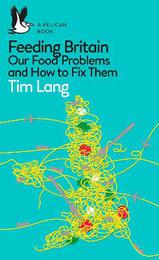
|
Feeding Britain: Our Food Problems and How to Fix Them
Paperback / softback
Main Details
| Title |
Feeding Britain: Our Food Problems and How to Fix Them
|
| Authors and Contributors |
By (author) Tim Lang
|
| Series | Pelican Books |
|---|
| Physical Properties |
| Format:Paperback / softback | | Pages:608 | | Dimensions(mm): Height 181,Width 111 |
|
| Category/Genre | Political economy
Sustainability |
|---|
| ISBN/Barcode |
9780241404805
|
| Classifications | Dewey:338.1941 |
|---|
| Audience | | Tertiary Education (US: College) | | Professional & Vocational | |
|---|
|
Publishing Details |
| Publisher |
Penguin Books Ltd
|
| Imprint |
Pelican
|
| Publication Date |
4 February 2021 |
| Publication Country |
United Kingdom
|
Description
'For years, food policy expert Tim Lang has been an almost lone voice in the wilderness, arguing that UK food security needs to be improved. In his new, very timely book, Lang notes that most consumers think that "as long as there is food on the supermarket shelves, all is well in the world. It is not"' Bee Wilson, Guardian British food has changed remarkably in the last half century. As we have become wealthier and more discerning, our food has Europeanized (pizza is children's favourite food) and internationalized (we eat the world's cuisines), yet our food culture remains fragmented, a mix of mass 'ultra-processed' substances alongside food as varied and good as anywhere else on the planet. This is a book on the politics of food- where it comes from, what we eat, and its impact. It argues that the Brexit vote will force us to review our food system. Such an opportunity is sorely needed. After a brief frenzy of concern following the financial shock of 2008 and recent Covid-19 upheaval, the UK government has slumped once more into a vague hope that the food system will keep going on as before. Feeding Britain argues that this and other approaches are short-sighted, against the public interest, and possibly even strategic folly. Setting a new course for UK food is no easy task but it is a process, this book urges, that needs to begin now.
Author Biography
Tim Lang is Professor of Food Policy at City University of London's Centre for Food Policy, which he founded in 1994 and directed until 2016. For four decades he has researched, written, advised and lectured on the food system at international, national and local levels, particularly in relation to health, environment, social justice, the political economy and consumer culture. He previously spent seven years as a hill farmer, an experience which shaped his work ever since.
ReviewsPresent discontents lend urgency to Lang's core message ... Security matters, and that includes food security. Lang has performed a public service. -- Simon Jenkins * Sunday Times * Forceful, illuminating, an ambitious manifesto ... The advent of coronavirus has added timeliness to Lang's warning about the fragility of our food supply. -- Martin Bentham * Evening Standard * When Lang says that "although not officially at war, the UK is, de facto, facing a wartime scale of food challenge", it's worth paying attention. We are in serious trouble ... It's a simple message, but in the white heat of a crisis, defined by queues outside supermarkets, a useful one. -- Jay Rayner * The Observer * Lang practically invented food ethics in this country ... Feeding Britain tells us how we could build a better food system, and shows that it is possible. -- Sophie Morris * The Independent * Feeding Britain is distinguished by the clarity and care with which it lays out urgent issues, most centrally that Britain does not produce enough food to feed itself. -- Erica Wagner * Financial Times * It is dense with statistics for journalists and academics to harvest and will, I suspect, become the go-to book for anyone interested in what is now going to be a hot political issue. -- Jamie Blackett * Daily Telegraph * For years, food policy expert Tim Lang has been an almost lone voice in the wilderness, arguing that UK food security needs to be improved. In his new, very timely book, Lang notes that most consumers think that "as long as there is food on the supermarket shelves, all is well in the world. It is not". -- Bee Wilson * The Guardian *
|